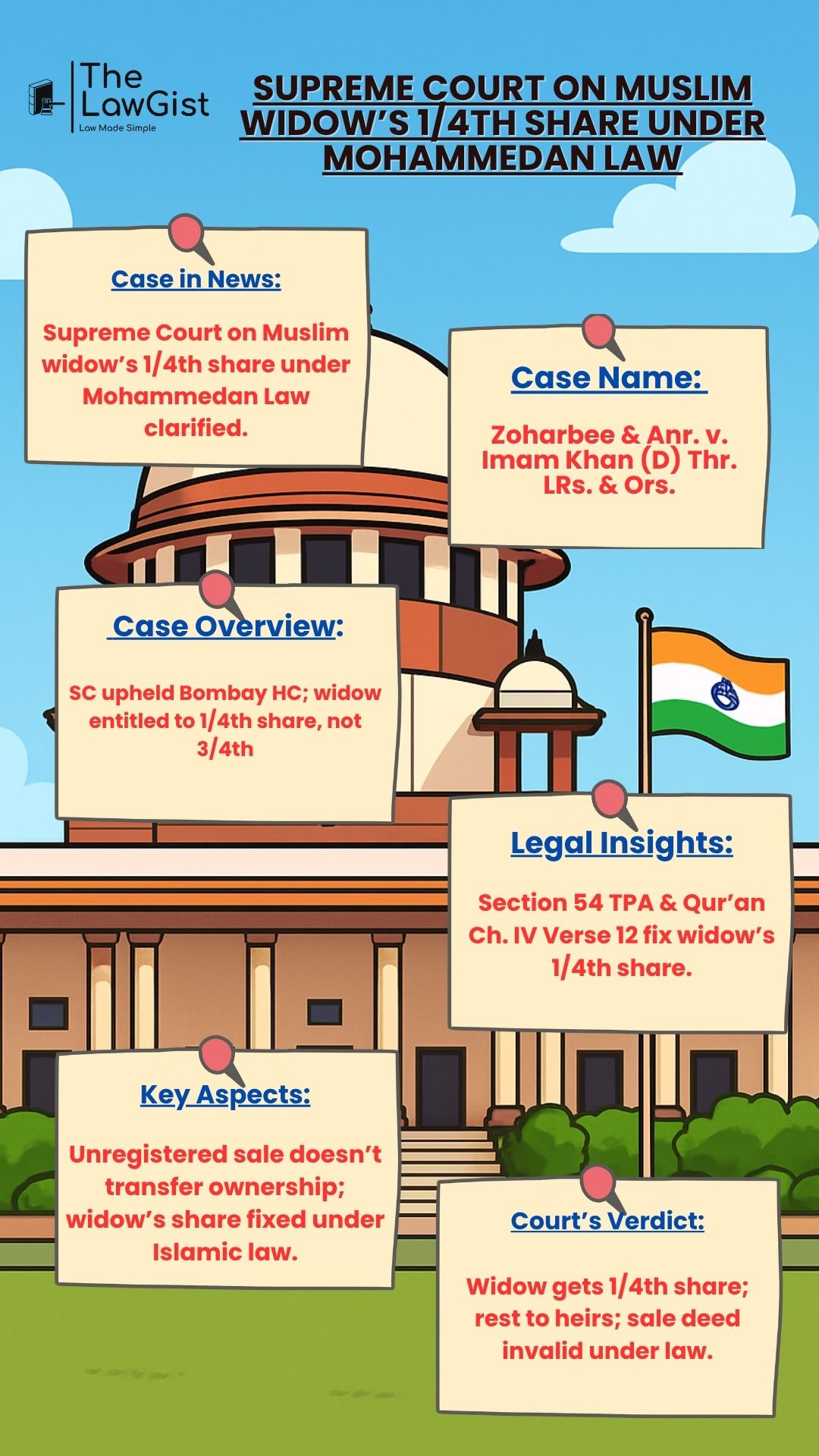
Supreme Court rules that a Muslim widow without children is entitled to only one-fourth share in her deceased husband’s estate under Mohammedan Law and Qur’anic inheritance principles.
Case in NewsThe Supreme Court On Muslim Widows 1/4TH Share Under Mohammedan Law reaffirmed that a childless Muslim widow is entitled to only one-fourth share in her husband’s estate . |
Discover powerful Latin Maxims and simplify complex legal terms in seconds.
Case Overview
Case Name: ZOHARBEE & ANR. vs. IMAM KHAN (D) THR. LRS. & ORS.
The Supreme Court of India, in a Bench comprising Justice Sanjay Karol and Justice Prashant Kumar Mishra, upheld the Bombay High Court’s ruling regarding the inheritance rights of a Muslim widow . The case involved the estate of Chand Khan, who died intestate and childless . His widow, Zoharbee, sought a 3/4th share of the property, claiming herself as the primary heir under Mohammedan Law . The respondent, the deceased’s brother, contended that part of the land had already been transferred through an agreement to sell . The Court examined whether such an agreement affected the widow’s inheritance rights and clarified her rightful share .
Step into the world of justice with Courtroom Chronicles
Key Aspects
Before listing its findings, the Court examined both factual and legal issues concerning succession and transfer of property .
- Chand Khan died without children leaving behind his widow, Zoharbee .
- The respondent argued an agreement to sell excluded a portion of land from inheritance .
- The Court held that an unregistered sale agreement cannot extinguish ownership rights .
- The dispute centered on the interpretation of the widow’s share under Mohammedan Law .
Legal Insights
The Court referred to both statutory and religious provisions governing Inheritance Rights Of Women In Islam .
- Section 54, Transfer of Property Act, 1882 – an agreement to sell does not convey ownership without a registered sale deed .
- Chapter IV, Verse 12 of the Qur’an – a widow inherits one-fourth of her husband’s property if he leaves no children; one-eighth if he does.
- Mulla’s Principles of Mahomedan Law (Para 61 & 63) – matruka (estate left behind) includes both movable and immovable assets, to be divided among heirs as per fixed Qur’anic shares .
- The Court reinforced that under Mohammedan Law, distribution of inheritance is predetermined and leaves no room for judicial discretion .
Court’s Verdict
The Supreme Court dismissed the widow’s plea for a 3/4th share affirming that under Mohammedan Law, a Muslim widow with no child or grandchild is entitled to only one-fourth of her deceased husband’s estate . The Court emphasized that the remaining property devolves upon other heirs, including brothers . It clarified that unregistered sale agreements cannot defeat legal inheritance rights . Thus, reaffirming the principle of equality and certainty, the Court upheld the Bombay High Court’s decision and recognized the fixed nature of inheritance shares under Islamic Law .
Source – Supreme Court of India
Read also – Muslim Law
The LawGist ensures exam success with quality notes—TPL, Current Affairs, Recent Judgments, and more. Backed by trusted resources and videos, The LawGist is every aspirant’s first choice. Discover more at thelawgist.org.







